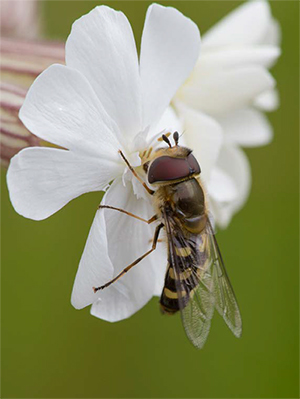A Chair for the agro-ecological transition
The creation of the "Resilient farms, beneficial for the climate and biodiversity" research chair was born of the coming together of VIVESCIA, an agricultural cooperative group and a major player in cereal production and processing in northeastern France, and UniLaSalle, a Polytechnic Institute at the heart of the challenges of transitions, around common objectives: improving knowledge and stimulating innovation to meet the challenges of the agroecological transition.
This chair, created in partnership with INRAE, is part of TRANSITIONS, a pioneering, practical program to support farmers in the North-East of France, run by VIVESCIA and its partners.
One of the major challenges facing agriculture is to adapt to climate change in order to maintain its food production role, contribute to maintaining or even increasing soil organic matter, and reduce greenhouse gas (GHG) emissions, as well as its impact on biodiversity. Reducing agriculture's environmental footprint (GHG and biodiversity) requires the development of agro-ecological practices combined with environmentally-friendly technological innovations.
Combining the adaptation of crops and cropping systems to a diversity of pedoclimatic contexts, with their contribution to climate change mitigation, brings an added richness to agrosystem management (from genotype to cropping system). One of the major objectives in speeding up this transition is to help farming systems evolve by better integrating the principles of agroecology.
"In the context of climate change, this Chair, the fruit of an historic collaboration between VIVESCIA and UniLaSalle, will help transform agricultural production systems by hybridizing the knowledge of farmers, VIVESCIA employees and our scientists".
Philippe Choquet, Managing Director of UniLaSalle
A living laboratory with a diversity of farms, soils and plants
At academic level, this partnership translates into :
- knowledge production with and for farmers
- creation of databases
- creation of guides
- seminars, conferences and articles
- tools and methods
- canopy management tool
- definition of future experiments
- assessment of the impact of practices and permanent plant infrastructures on biodiversity restoration
"Science and innovation, combined with feedback from the field, form the basis of our TRANSITIONS program.
By 2026, this program aims to support almost 1,000 farmers in our regions in their transition to productive, low-carbon agriculture that is good for the soil and biodiversity. A fundamental partnership for VIVESCIA, this research chair with UniLaSalle is a gas pedal of solutions and progress for TRANSITIONS and our value chain."
Christoph Büren, Chairman of VIVESCIA
Research focused on the sustainability and resilience of agricultural production systems and territories
The aim of the project is to identify which of VIVESCIA's cultivation practices can help farming systems adapt to and mitigate climate change.
It has four objectives:
- Highlight high-performance, stable varieties and optimal technical itineraries for adapting crops to climate change.
- Improve the greenhouse gas emissions balance of cropping systems by identifying combinations of agroecological practices.
- Maximize the biomass productivity of intermediate crops and their ecosystem services
- Design or adapt a method for assessing farms for biodiversity restoration

"French and European agriculture will have to reconcile economic and productive performance, restoration of biodiversity and resilience to climate change. To achieve this, we need to co-construct, in all regions, with professional players in production and processing, the path of transition towards profoundly revised agricultural and food production systems. Agroecology, by mobilizing functional diversity, offers levers for action that enable adaptation to local conditions. VIVESCIA, with its TRANSITIONS program, and UniLasalle have joined forces to create an industrial chair, with the ambition of training tomorrow's players and managers, and conducting research with other national research organizations and universities".
Christian HUYGHE, Scientific Director for Agriculture at INRAE
About our partners
VIVESCIA
VIVESCIA is an international agricultural and agri-food cooperative group with sales of 4.6 billion euros at June 30, 2023, and 6,900 employees in 25 countries. Specialized in the cultivation and valorization of cereals, VIVESCIA is owned by 10,000 farmer-entrepreneurs in northeastern France.
VIVESCIA is committed to taking care of the grain, from the Table to the Field, with its collective of men and women committed to sustainable plant chains. 3.3 million tonnes of cereals are collected by the Cooperative and its agricultural subsidiaries, 1 beer in 10 worldwide is produced with our malt thanks to Malteurop's know-how. Our Francine flour is found in the kitchen of one in three French households. Every day, Grands Moulins de Paris works with nearly one baker in four. Thousands of consumers share savory, sweet and gourmet breaks in France and around the world, thanks to the croissants, viennoiseries, pastries and breads made by Délifrance. Our expertise is also deployed in the corn semolina industry with KALIZEA, in animal nutrition with NEALIA, and within the biotechnology and plant chemistry ecosystem with ARD.
UniLaSalle
UniLaSalle, a new generation of Grande Ecole.
UniLaSalle is a polytechnic institute of higher education and research, with more than 4,200 students on 4 campuses (Amiens, Beauvais, Rennes, Rouen), formed from the merger of five engineering schools and the creation of a veterinary school. At the heart of the challenges of transition, it is shaping a new generation of Grande École that unites the sciences of Life, Earth, Environment and Energy with industrial sciences and digital technologies.
As a member of the worldwide LaSalle Universities network, UniLaSalle is pursuing its 170-year-old educational project: revealing the potential of each individual. It is based on a relationship of trust and a rich student experience, founded on a collective pedagogy that encourages action for the common good.
UniLaSalle is committed to building a more humane, fairer and more sustainable world together, through its research serving industry sectors and regions, and through its training courses.